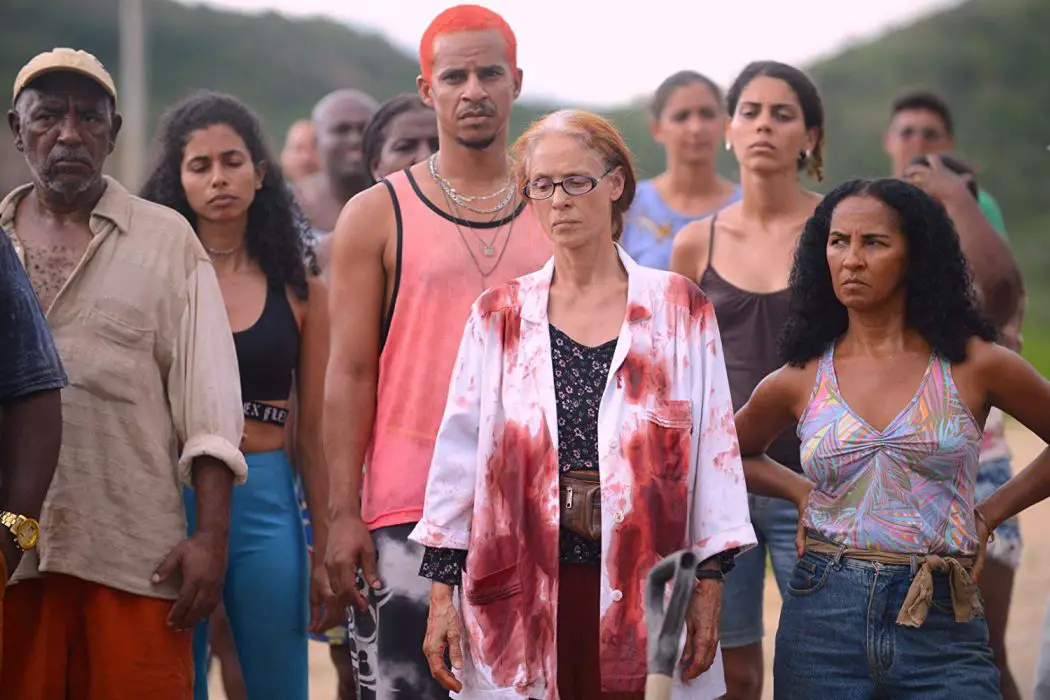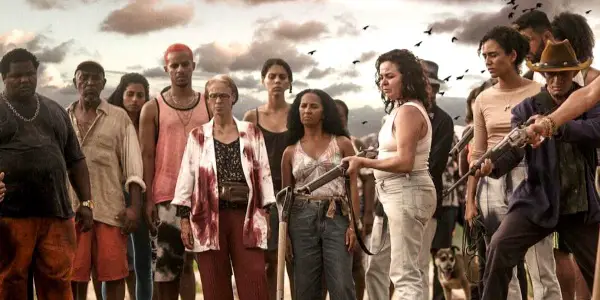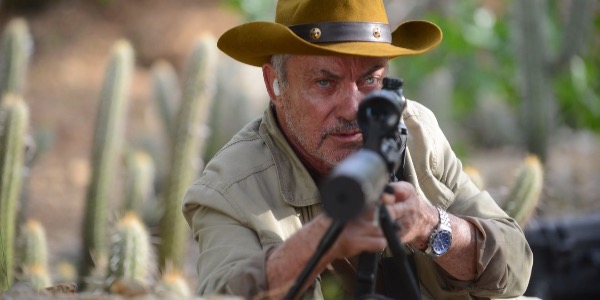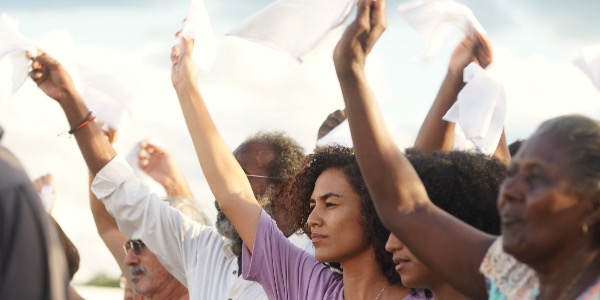Directors Kleber Mendonça Filho & Juliano Dornelles On Their New Film BACURAU

Andrew Young is a freelance writer on film and culture…
When I first met Bacurau writer-directors Juliano Dornelles and Kleber Mendonça Filho, the latter is keen to know where I saw the film – “How was the sound?” being his most pressing concern. Having seen the film you may understand its directors’ desire that it is shown loud and clear. This is a film that ranges from quiet, grubby moments, to violent bombast. Whether it is a bizarre group dance or a gunshot, this is a strong sensorial experience. Like many a famous thriller its brutality is matched by its politicised satire and a dark and playful humour. Here, we have a futuristic tinge too, as the small Brazilian community of Bacurau finds itself under threat from a mysterious group that use drones, satellite maps, and a heck of a lot of guns.
United They Stand
Filho, an established international filmmaker who received great acclaim for 2012’s Aquarius, has worked with Dornelles multiple times before, but usually with the latter as a production designer. Here they teamed up as co-directors and co-writers. It was not one approaching the other, or a burning desire to work together, but a common goal, a shared disdain in fact, that brought them to this point.
After the festival success of short film Cold Tropics, which they both worked on – and is available on Vimeo Filho makes sure to add –“we were watching films,” he explains, “and one of these films made us think about making a genre film about a wonderful community, which in the type of film that we were watching is treated as simple people, exotic, kind of sweetly ignorant.” This seed of a film, where rural communities are not patronised but celebrated, would become Bacurau a full decade later.

Quite reasonably, the directors refuse to say what film they were watching; Dornelles acknowledges however that “there are many films like that, in every country” with “even some very good films” being guilty of it according to Filho. A question they will answer, however, is how they managed to put their vision of a strong rural community on the screen. The answer, it seems, comes with who they put both in front of and behind the camera. “We had an amazing team of friends, collaborators,” says Dornelles. The crew was made up largely of Filho and Dornelles’ friends, people who had worked together many times before, and whom the two filmmakers cannot praise highly enough. They were all “in sync”, helping create an inclusive community feel on set.
When deciding who would be the inhabitants of Bacurau and embody this sense of community, there were “different layers of casting”, explains Filho. At one level you have “international stars with huge experience in the history of cinema” like Sonia Braga, who plays a controversial matriarch figure. “Then you have wonderful professional actors from all over Brazil, from the North East, from Texas, New York City, London. And then, we have the extras who got speaking parts because they were so amazing.” The final layer was the remaining extras who, the directors insist, “were treated as a group of actors”.
This is something the two filmmakers seem particularly proud of. It was this approach, coupled with plenty of rehearsal time for the entire cast, that allowed Dornelles and Filho to craft such an authentic-feeling picture of rural lives. “I don’t wanna sound like I’m blowing my own trumpet,” says the latter, inviting much innuendo-inspired laughter from his co-director. “But the extras in Bacurau are not just extras, because I know what extras look like in many films. For instance, I’m talking to you and there’s a couple of bottles of water over there: they’re the extras. They just happen to be people, not bottles of water. In Bacurau they’re actually alive and they compose this human panorama.”
This level of detailed preparation is largely unnoticeable in the film, which is itself testament to the work being done. “There are a couple of shots,” continues Filho, “with about 15 or 20 people in the shot and everybody’s great in the shot. They all know what’s happening and that’s quite rare. Because you could get maybe 11 people who are great and then one guy’s thinking about his laundry.” Everybody on set “understood the scenes and they understood the film,” adds Dornelles. “Many situations in the film they are used to, they have actually lived.”
A Futuristic Vision
Having created a community that both the two Recife-born directors and their cast recognised, the next step for Filho and Dornelles was to disrupt it. The film’s early scenes have a social-realist feel, but where we may expect trouble to come in the form of poverty or social injustice, instead a sci-fi-ish element gradually builds. From early on, something dystopian and nefarious is afoot in Bacurau. A water truck is riddled with bullet holes, the town begins to vanish from maps, and an opening title card reads: ‘A few years from now’.

The “few” in that time-stamp is a very hard thing to approximate. “Our team kept asking how far into the future it is and we could never give a straight answer,” says Filho. Throughout Bacurau there are shots which deliberately obscure the technology being used, a technique its directors acknowledge. “The little elements of technology are very suggestive,” argues Filho, and even when we do discover what’s hiding in someone’s pocket or lurking in the skies, “your mind is already working, your imagination has already been set off.” These shades of sci-fi give the film a mystery and a modernity that Filho says make a nice contrast with the otherwise traditional setting: “I really like the idea that futuristic technology comes into collision which archaic living structures in a poor community.”
This collision, in keeping with the film’s sensitive and politicised approach to its depiction of these characters, does not bring with it any amount of patronising humour. The people of Bacurau may live rurally, but they are not out-of-touch and unintelligent as some films may paint them to be. When they see a drone, they know it’s a drone, despite looking it looking like “a flying saucer from an old movie”. “It’s not some country person saying, ‘I saw a monster in the sky,’” reiterates Filho. “That’s not our film.” Dornelles says the thinking behind this approach reminded him of a scene in 80s comedy Crocodile Dundee.When an aboriginal man approaches Dundee and a girl from New York, she “picks up a camera and points to him and the aboriginal man says, ‘No,’ and the girl asks: ‘Why? Are you afraid that I’m gonna take your soul?’ And he says, ‘No, no, no, the lens cap is on.’”

Everything about Bacurau and the two serious, artful filmmakers who created it should suggest that a Crocodile Dundee reference is the last thing you could imagine coming up. And yet here we are. It is apt, perhaps, that Filho and Dornelles surprise with how funny and playful they can be given that their film, too, has that blend of ‘serious filmmaking’ and tongue-in-cheek fun. It is a work that consistently subverts expectations, and in fact relies on those expectations to succeed.
Same but Different
The co-directors carried this desire for subversion throughout Bacurau, extending into its existence as a genre film, which both lovingly homages and tweaks its classic Hollywood influences. Both Filho and Dornelles seem keen to affirm that this is “a genre film” and a “love letter” to the Hollywood cinema of the 70s in particular. Numerous critics have spoken about Bacurau’s open riffing on John Carpenter movies, but its creators extend their references to the classic Western, with Dornelles saying the film acts as a corrective to “the classic Westerns of the 30s, 40s, even the 50s”, where “the invaders are the Indians”. Here it is the Americans who are the invaders, with Dornelles and Filho actively attempting to subvert the politics of the films they homage.
In general, despite their open admiration for Hollywood moviemaking, America does not come out of Bacurau particularly well. Many of its band of sadistic antagonists hail from the States, and there is much satirising of gun fetishism, an obvious touchpoint of warped American culture. Filho says he can see the “provocation” in what they have done, but insists that it was a pleasure working with the “amazing” American actors and that they wanted the film to appeal to an American audience. “There is something very pleasurable about making a genre film in Brazil and then having American actors and characters, who basically act and speak like they are in an American film,” he explains. “This is very much a Brazilian film, but we use a lot of tools that come from American cinema, from panovision lenses to blocking and to crane shots, and certain concepts of sound. So I really like the idea of having those characters in the film.”
However the film goes down in America, it has proved a big success in Brazil, given its “medium-small release”. The pair seem proud of their success with an admittedly weird and far-from-mainstream work. “Competing with very powerful Hollywood productions is very difficult in Brazil,” says Dornelles. “For example when they released the last Avengers in Brazil, they occupied 92% of all screens in Brazil.” In parts of Brazil you would have “12 screens, 12 Avengers” they explain, but at least “you had choice,” laughs Dornelles, “between 2D and 3D.” For a real alternative choice, a more subversive and thoroughly entertaining choice, maybe try Bacurau.
What did you think of Bacurau? What other films do you like which subvert existing genre tropes? Let us know in the comments!
Does content like this matter to you?
Become a Member and support film journalism. Unlock access to all of Film Inquiry`s great articles. Join a community of like-minded readers who are passionate about cinema - get access to our private members Network, give back to independent filmmakers, and more.
Andrew Young is a freelance writer on film and culture from Manchester, UK. If you like his writing, Andrew also runs a more informal film website at reeltime.blog












